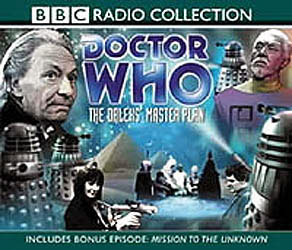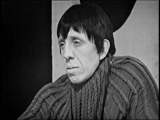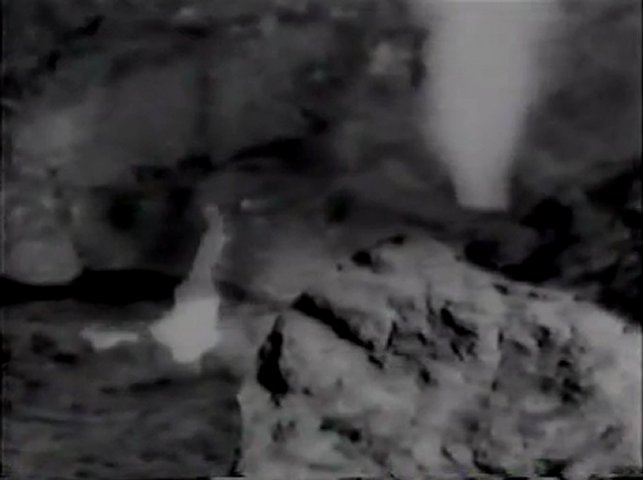And so the 12-part epic finally draws to a close with only
one of the last 5 episodes existing.
Whilst Dennis Spooner took over the reins from Nation, that he still
gets a mention – “An idea by Terry Nation” – speaks volumes of the quality of
this script in comparison to his earlier, and indeed his uncredited later, work
on Doctor Who.
 Where this serial really falls flat is in the retreading of
the old concept – The Chase did this
all much earlier, and to some extent more successfully. Whilst The
Chase was not laugh-out-loud hilarious, one would expect the premise, once
injected with Spooner’s humour, to provide copious giggles. Having said that, the set pieces here are far
more believable, with some entertainment mined out of the fantastic design
work, as well as the performances of two of the guest actors – Kevin Stoney
continues to be absolutely delightful to watch, or indeed simply to listen to,
as he spirals further out of control, his deluded ravings played
wonderfully. Likewise, the reappearance
of Peter Butterworth as the Monk, last seen stranded in 1066, provides some
light relief. Overall, though, episodes
7 to 10 are utterly pointless.
Where this serial really falls flat is in the retreading of
the old concept – The Chase did this
all much earlier, and to some extent more successfully. Whilst The
Chase was not laugh-out-loud hilarious, one would expect the premise, once
injected with Spooner’s humour, to provide copious giggles. Having said that, the set pieces here are far
more believable, with some entertainment mined out of the fantastic design
work, as well as the performances of two of the guest actors – Kevin Stoney
continues to be absolutely delightful to watch, or indeed simply to listen to,
as he spirals further out of control, his deluded ravings played
wonderfully. Likewise, the reappearance
of Peter Butterworth as the Monk, last seen stranded in 1066, provides some
light relief. Overall, though, episodes
7 to 10 are utterly pointless.
When making this serial 12 parts, the crew clearly believed
they were making an epic piece of television, and it is; it just isn’t a consistent one. With the bizarre and out of place episode 7,
the tone is still undecided when we pick up with episode 8. Whilst the Daleks are back, and are genuinely
chilling, the sequences involving the TARDIS crew are still rather fluffy,
lightweight and comedic. Of course, some
of this comedy is intentional and clever – the scene at the cricket test match
is clever, with the dry delivery of the script perfectly balanced against the
very ridiculousness of the scene. Yet
the point is that the scene is ridiculous.
 The sequences with the Daleks and Trantis are superb, and re-establish
the innate fear that the Daleks should instil in the viewer. Their cool and calm exterior, as they insist
that Trantis be the test subject for the destructor is chilling, and one can
only imagine how the other delegates must have responded to this terrifying
turn-up – they are all expendable. To
add to this, once they have realised that the taranium core is false, the
Daleks exterminate Trantis anyway. At
this point, even Chen realises he is vulnerable – and as such he works harder
to prove his worth. To add to this, once
they have realised that the taranium core is false, the Daleks exterminate
Trantis anyway. The Daleks summon their
own time machine “immediately”, but the machine doesn’t arrive for some 5
minutes – making no sense – although this allows them further time to confront
Chen, presumably to terrify him, but in fact only adding to his
megalomania.
The sequences with the Daleks and Trantis are superb, and re-establish
the innate fear that the Daleks should instil in the viewer. Their cool and calm exterior, as they insist
that Trantis be the test subject for the destructor is chilling, and one can
only imagine how the other delegates must have responded to this terrifying
turn-up – they are all expendable. To
add to this, once they have realised that the taranium core is false, the
Daleks exterminate Trantis anyway. At
this point, even Chen realises he is vulnerable – and as such he works harder
to prove his worth. To add to this, once
they have realised that the taranium core is false, the Daleks exterminate
Trantis anyway. The Daleks summon their
own time machine “immediately”, but the machine doesn’t arrive for some 5
minutes – making no sense – although this allows them further time to confront
Chen, presumably to terrify him, but in fact only adding to his
megalomania.
After the cricket match scene, the TARDIS skips again, with
its unknown pursuers still on their tail, this time materialising on a volcanic
planet, a new planet shifting and changing beneath them. The description is stunning, and again,
without anything to see, we can only imagine just how good it looked – Camfield’s
skill would undoubtedly have ensured that it looked fantastic. As it turns out, the pursuer is none other
than the Monk, turning up at the most inopportune moment for the Doctor and his
companions. The Monk has vowed vengeance
after the Doctor’s little trick left him stranded in the history of the Earth,
and so he decides to damage the locking mechanism of the Doctor’s TARDIS,
stranding him on this newly-born planet.
The scenes between Hartnell and Butterworth are as entertaining and
rewarding as any of Spooner’s dialogue from The
Time Meddler, but without any of the strong plotting to support it. This
all simply feels like filler – as though Spooner looked at Nation’s plot
outline, and thought – “Shit, I really need to make this better. I know – I’ll bring back the Monk!”
 The Monk’s plan to do something to the lock of the TARDIS
sort of makes sense, in a childish way – but here, though, it is almost
perfunctory. No sooner has he damaged
the lock, the Doctor manages to fix it – also in the most ridiculously
perfunctory manner; he somehow refracts the light of the sun via his ring into
the TARDIS door to open it. Now,
Camfield’s direction is always sterling, so I’m sure this looked good – but based
on the soundtrack alone, it’s all very redundant. To further cement that this whole run-around
has simply been additional filler, the next landing of the TARDIS crew sees
them by the river Thames on New Year’s Eve, seeing in New Year’s Day – another gimmick
to prove that all that is happening here is pointless frivolity.
The Monk’s plan to do something to the lock of the TARDIS
sort of makes sense, in a childish way – but here, though, it is almost
perfunctory. No sooner has he damaged
the lock, the Doctor manages to fix it – also in the most ridiculously
perfunctory manner; he somehow refracts the light of the sun via his ring into
the TARDIS door to open it. Now,
Camfield’s direction is always sterling, so I’m sure this looked good – but based
on the soundtrack alone, it’s all very redundant. To further cement that this whole run-around
has simply been additional filler, the next landing of the TARDIS crew sees
them by the river Thames on New Year’s Eve, seeing in New Year’s Day – another gimmick
to prove that all that is happening here is pointless frivolity.
The cliffhanger, involving the Daleks chanting “Conquest!” repeatedly
leads into the following episode nicely, with the Daleks and Chen following the
Doctor and his companions to ancient Egypt.
Essentially another strand in the remake of The Chase, this one last almost two whole episodes, seeing the
Doctor spend almost the entire ninth episode fixing a door lock, and having
Steven and Sara inevitably captured – and then escaping from – the indigenous locals;
essentially it is a very broadly drawn historical, with almost no
characterisation, but with the Daleks thrown in for good measure.
That said, there are some enjoyable moments here too – the scenes
between Mavic Chen and the Monk sound hilarious, and from what we can see of
episode ten, their interchanges are very funny, filled with eye rolling and
disdain for one another. The Monk does,
of course, get the best moments throughout episode 9, particularly in the scene
in which he pulls out his sunglasses to mask the glare on the sunlight. His twofaced-ness between the Doctor, who he
loathes, and the Daleks and Chen, who he clearly fears, is brilliantly played. The cliffhanger for episode 9, though, is one
of the most obscure, blending genres once more, as the wrapped hand emerges
from a sarcophagus.
Fortunately, episode ten does exist, which allows us to
remember that Camfield is truly a genius – once it is moving again, we realise
the depth of field which Camfield permits.
There are some stunning shots – the cross-fade between the sun and the
reflection on the Dalek casing is beautifully fluid. Likewise, the set design here is superb, and
the cycloramas are wonderfully painted, creating a sumptuous level of detail
and depth. Episode 10, in fact, includes
some great moments of genius – the face-off between Mavic Chen and the Dalek is
wonderful too, and no detailed audio narration from Purves could possibly do
this moment justice – as he balks furiously at it, he knocks the eyestalk off
to one side – and in retaliation, the Dalek confronts Chen thoroughly, getting
right into his personal space and becoming a palpable threat once more. Once the cliffhanger is resolved, meanwhile, the
scenes involving the Monk and Steven and Sara are brilliant – as the TARDIS crew
discuss what is best to do in the background, the Monk fills the foreground,
complaining of headaches and desperate to gain entry to the Doctor’s ship. Likewise, humour is prevalent once Steven and
Sara are taken to the Daleks as “hostages”, and Mavic Chen calls out over a
loudspeaker system, hailed by Egyptians to be the voice of God, is very clever.
The episode ending, meanwhile, is exactly where the serial
should have left off from episode 6 – rather than handing the false core over 4
episodes again, the drama would have been far superior had we had seen the
Doctor hand over the real core, and picked up on this cliffhanger. Whilst the introduction of the Monk was fun,
and a brief distraction, the dramatic impact of the final two episodes, which
are simply superb, would have been far superior.
 The scenes involving the delegates are superb, particularly
the unnerving silence offered by the Daleks, are brilliant; the moment that the delegates try to turn on
Chen is brilliantly played, but upon his persuasion of them, Chen instantly
becomes the leader again, even so delusional as to continue the pretence of
leadership once the group are locked in.
Chen’s vanity is seemingly unending, and it is troubling – never before
have we seen such a fickle human nemesis for the Doctor, and we shan’t again
for quite some time (possibly the next best will also be Stoney n The Invasion). Once the group of delegates are freed by
Steven and Sara, Chen’s false suicide is quickly undermined by his
reappearance. What is interesting is
that whilst the other delegates all rush home to save their individual
galaxies, Chen’s delusions of grandeur extend well beyond the safety of the
solar system.
The scenes involving the delegates are superb, particularly
the unnerving silence offered by the Daleks, are brilliant; the moment that the delegates try to turn on
Chen is brilliantly played, but upon his persuasion of them, Chen instantly
becomes the leader again, even so delusional as to continue the pretence of
leadership once the group are locked in.
Chen’s vanity is seemingly unending, and it is troubling – never before
have we seen such a fickle human nemesis for the Doctor, and we shan’t again
for quite some time (possibly the next best will also be Stoney n The Invasion). Once the group of delegates are freed by
Steven and Sara, Chen’s false suicide is quickly undermined by his
reappearance. What is interesting is
that whilst the other delegates all rush home to save their individual
galaxies, Chen’s delusions of grandeur extend well beyond the safety of the
solar system.
Hartnell’s absence is also played upon in this story – much like
the knowing conventions were played upon in the Christmas special. Whilst he appeared in the opening scene, his
disappearance is commented upon by Steven and Sara as they pace the abandoned
Dalek base, and Hartnell’s Doctor is used as a motivation for Chen; his
grandeur is so obscurely over-the-top that he genuinely seems to see the Doctor
as a threat – but not in a physical sense, rather that he is worried that the
Doctor will replace Chen himself as the assistant to the Daleks. It is interesting in that, for all that Chen
has appeared throughout this story, he has only had two prior scenes with
Hartnell, and sees him in such a way.
Episode 12 sees us finally reach the end of this epic,
sprawling serial – and it is a truly explosive finale. The Daleks finally do what was to be
expected, and they turn on Chen. But it
is the way in which they turn on him that is truly terrifying. After the repeated screams of “exterminate”, “eradicate”
and “conquer”, it is at this precise moment that the Daleks decide to be
utterly silent. They glare, and watch,
as his megalomaniacal breakdown goes well beyond anything we could have
expected. And then, they exterminate him
anyway. It is chilling, and fitting. Purves’ description of Chen, falling to the
floor with “a look of astonishment on his face” is superb.
The entire end sequence is chilling and horrific, in fact; once the Doctor arrives, and takes the time
destructor from the Daleks, everything becomes a battle against time. The sound effects are haunting throughout,
and as Sara races back to assist the Doctor, against his wishes, we realise
that there is a sense of finality to this story, in the way that Katarina’s
story, and Bret’s story, have each come to their bitter conclusion too. Through her attempts to help, however, Sara
ultimately achieves nothing. And that is
the bitterest pill to swallow. She
sacrifices herself needlessly, for no ends, in the most horrific death we’ve
seen yet on Doctor Who, and still the
most horrific 49 years later.
Again, without this scene existing, it is almost impossible
to tell how this looked, but again, knowing Camfield, it was horrifically
outstanding – the description, and the stills, of Sara’s body aging
horrifically as the sands of time whip at her are awful. What reinforces this is Hartnell’s ungodly
scream at Steven when he dares to have left the TARDIS, really ensuring we
realise the danger involved. The image
of her skeleton – all that is left of this brave and fierce woman – disintegrating
and being tossed asunder by a zephyr of time is haunting. Likewise, the sounds of the Daleks being
destroyed, returned to their primitive state, metallic exoskeleton being torn
away, leaving simply the embryo, small and soft and vulnerable, is terrifically
ambient.
And that final scene, of Hartnell picking up the Dalek
embryo and chuckling, before being reminded of the price paid for this small
victory, is awful. We realise that,
really, the Doctor has lost this one. Although
the lives of nameless billions have been saved, it has cost the Doctor the
lives of 3 companions.





Excellent write-up and analysis! It really is a pity that the final two episodes, as far as we know, no longer exist. There is the excellent novelization by John Peel, of course, and the audio tracks. But I still would have been thrilled to see the apocalyptic finale of this epic story.
ReplyDeleteIn any case, I think Jean Marsh as Sara Kingdom was a fabulous character, and I've really enjoyed hearing her return to the role in the Big Finish audio stories set during the break between episodes seven and eight of The Daleks' Masterplan.